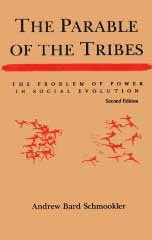The president's reading list

If you had the chance to recommend a few books for the two presumptive candidates for U.S. President to read with the guarantee that they would actually read them, what books would you suggest they read? This was the question posed by a talk radio host on one of the Boston local stations last week. Most of the suggestions from callers (and the co-hosts) were interesting, but pretty predictable and bland -- political biographies, by far, dominating the list.
I kept thinking about that question for the rest of the day. So many came to mind that had an impact on me. But I kept forcing myself to think about one or two that might really affect the thinking of someone who would be the next president. What books would make your list?
'Parable of the Tribes' would be high on my list. (GW)
 The Parable of the Tribes: The Problem of Power in Social Evolution
The Parable of the Tribes: The Problem of Power in Social EvolutionBy Andrew Bard Schmookler
Berkeley: University of California. 1995
The subject is power. And the author's thesis is obvous only in the sense that Newton's law of gravity seems obvious to those who think it states that ''what goes up must come down'' or Mendel's laws to those who construe them as stating that ''blood will out.'' Mr. Schmookler's ''parable'' certainly does not have the far-reaching and marvelous precision of Newton's law or the originality of either Newton's or Mendel's laws, but it goes far beyond our common folk knowledge about power. Standing on the shoulders of some giants of social and political theory and enlisting the aid of leading modern figures in political anthropology, Mr. Schmookler surveys a vast landscape of history and ethnology that has been molded by power in something like the way the physical landscape has been molded by gravity - sometimes obscurely or indirectly but nonetheless lawfully. What he describes, if not nice, for the most part has a logic that is satisfying. (New York Times Book Review).
Excerpt:
As man became freer of the controls of nature, he became subject to new, perhaps harsher necessities. Paradoxically, the very open-endedness of human possibilities created forces that drove human destiny in a direction that people did not and would not choose. Civilization represented not the old cultural process coming to fuller fruit but a new phenomenon governed by a wholly new evolutionary principle. The emergence of this new principle marks the vital point of discontinuity in the history of life and explains civilization's problematic course.
The new human freedom made striving for expansion and power possible. Such freedom, when multiplied, creates anarchy. The anarchy among civilized societies meant that the play of power in the system was uncontrollable. In an archaic system like that, no one can choose that the struggle for power shall cease. But there is one more element in the picture: no one is free to choose peace, but anyone can impose upon all the necessity for power. This is the lesson of the parable of the tribes.
Excerpt:
A handicap in the pursuit of power is integrity, that unity between the ground of one's existence and one's values and one's actions. Power systems are therefore hostile to integrity and to the humane cultural traditions that provide an orientation to help people achieve it. The power that erupted in the West has from the outset sought the disintegration of the cultural principles that stood in its way...The disintegration of culture allows more mechanical priniciples to enter the social body and govern it.
Shaped by power, our systems are in many ways not our tools. Indeed, they press us to become instruments to their ends. The needed integrity between human needs on the one hand and cultural design and practice on the other remain far from realization in a world ruled by power. The challenge to us is to find a way to act with integrity and with an understanding of the antagonism between the human and the power system.
The opposite of integrity is opportunism, which is the willingness to allow the environment to govern one's course. Like water flowing downhill, the opportunist takes the course of least resistance. In an ideal world, opportunism and integrity would be the same thing. But as long as social evolution is governed by forces that threaten to drag human well- being down, the only responsible course is to labor against the current. At the same time, in a world filled with grave necessities, one cannot survive by simply going against gravity. For integrity to be more than gesture and martyrdom, it, too, must find its opportunities. In a complex and dangerous world, the path for individuals and for societies between self-destruction and the loss of soul is at best narrow but not straight.

0 Comments:
Post a Comment
<< Home